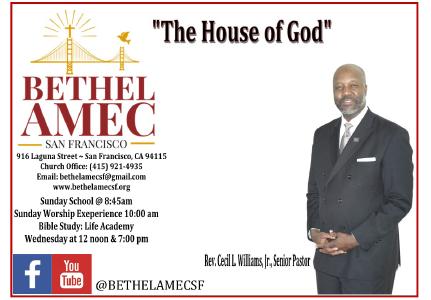

Oakland Post


By Richard ‘Razor’ Johnson
As I ponder the tremendous loss of my attorney Dan Siegel, my heartfelt wishes go out to his family.
I met Dan through his courageous wife, Anne Weills, who was part of the legal team that stood firm against the corrupt prison system by fighting for justice for many of us who had been held captive behind prison walls.


Dan Siegel, Presente
By Mike Siegel

After 52 years of civil rights litigation and 79 revolutions around the sun, my father Dan Siegel passed away on July 2. To the very end, he spent his time in struggle for a better world.
Here in Oakland, the community knew Dan through his political and legal work.
Born in the Bronx and raised in Long Island, he came to Berkeley in 1967 to study law and join the movement against the Vietnam War.
Dan was inspired to become

By Justin Phillips
This week, Oakland Mayor Barbara Lee launched “Keep The Town Clean,” a citywide initiative designed to address illegal dumping and blight through high-visibility
cleanup events in each council district. The program, launched within the mayor’s first 100 days in office, emphasizes environmental justice, youth engagement, and collaboration between city departments,
community organizations, and local businesses.
Kicking off on July 8 with a cleanup event in District 6 that ran from 12-3 p.m., beginning at Greenleaf Elementary at 6328 E.
a lawyer after spending the summer of 1965 volunteering with the Congress on Racial Equality (CORE) to register voters in North Carolina.
When I was growing up, my dad told me stories about being threatened by local “good ole boys” and getting freed from jail by a National Lawyers Guild attorney. He was radicalized by the experience and committed himself to being a part of the Civil Rights Movement.
Dan’s time at UC Berkeley studying law set the stage for much of his life and career. In 1969, after being elected as student body president, he gave a key speech during a “People’s Park” protest that was followed by thousands of people marching from campus and confronting police and sheriff’s deputies.
Gov. Ronald Reagan called in the National Guard and numerous
By Ken Epstein
Oakland civil rights attorney
Dan Siegel, who fearlessly participated as a lawyer in fights against racism and for workers, unions, and human rights for more than five decades, died on July 2. He was 79.
He earned his reputation as an advocate for justice in the courtroom and also while standing with others as an outspoken activist in the community.
In a final demonstration exemplifying his lifelong commitment to the collective struggle for justice, his final public appearance was a speech at the Oakland “No Kings” rally on June 14, where he called on the crowd of 10,000 in front of Oakland City Hall to oppose Donald Trump and the white supremacist movements backing his presidency.
Said Oakland Mayor Barbara
Lee in a press statement, “Oakland has lost a true champion, Dan Siegel, who I knew for many years,” calling him a “pathbreaking civil rights lawyer and dear friend.” An obituary written by his family described Siegel’s roots.
“Born in the Bronx, Dan’s life was shaped by his upbringing in a Long Island Jewish family, his commitment to civil rights struggle, his marriage to fellow attorney and activist Anne Weills, and his family, including two sons and three grandchildren,” the family wrote.
“After graduating from Hamilton College in 1967 with a degree in religious studies, he moved to Berkeley to attend law school. He was inspired to become an attorney after being arrested in Mississippi while working with the Con-

By Magaly Muñoz
Special to The Post
In a significant win for local and Black-owned businesses, the Oakland City Council’s Public Works and Transportation Committee voted decisively during a special meeting on July 8 to recommend a new approach to the citywide security contract — one that prioritizes locally headquartered companies and scrutinizes the track records of outof-state mega-corporations.
At the heart of the debate was Marina Security Services, a 100% Black-led, locally based firm that
received the same evaluation score as a global security conglomerate headquartered in Pennsylvania. The multinational corporation, which operates in six countries and has a history of documented labor and safety violations, was nonetheless the staff’s initial recommendation —despite being more expensive.
Community leaders and advocates were outraged by what they saw as an unfair and opaque interview process that tipped the scales in

Cathy Adams, CEO of the Oakland African American Chamber of Commerce. Photo by Auintard Henderson.
Left to right: Dr. Hindatu Mohammed (Michael’s wife), Dan Siegel, (his granddaughter Malika, grandson Hamza, his wife Anne Wiells Siegel. Courtesy photo.
Dan Siegel speaking at Oakland’s “No Kings” rally reflected the Biblical Daniel who stood in the lion’s den. “Dan dared to stand alone on principle with a true purpose. He dared to make it known. Like Paul Robeson, Dan also always
Photo by Gay Plair Cobb.
Michael Siegel.
A ‘New Direction’: West Coast Black News Publisher, Dr. John Warren, Elected Board Chair of NNPA

By Tanu Henry California Black Media
Dr. John Warren of the San Diego Voice & Viewpoint made his mark at the 2025 National Newspaper Publishers Association (NNPA) annual convention in Savannah, Georgia when he became the third person from the West Coast to lead the 85-year-old organization, whose members are mostly from the East Coast, South and Midwest.
Warren says he has been preparing for the job for more than 20 years.
NNPA members elected Warren at the conference held from June 26 to June 28.
In his new leadership role, Warren plans to bring a “new direction” to the Washington, D.C.-based organization that represents more than 230 African American-owned newspapers and media companies across the United States.
“Now, I won’t telegraph all my plans,” Warren joked when California Black Media (CBM)
asked him to share his vision for the organization founded in 1940 as the National Negro Publishers Association.
“I will say this: I will push to reinvigorate the NNPA, starting with each region,” said Warren, who is also an attorney, ordained minister, U.S. Army veteran and college professor. He has also served as a Washington, D.C. Board of Education member and U.S. congressional aide.
“I will bring people back — people who have pulled away over the years,” Warren continued.
“There is a whole new board of directors elected with me. We will organize major training sessions before we begin our work, taking a close look at the organization’s priorities and operations, everything — budget, finance, programs, etc.”
Warren said there is a perception that the NNPA has been “a closed and selective network” serving the needs of only some members. He promises to change that, taking
Continued on page 6

California
Superintendent of Public Instruction Tony Thurmond. File photo.
‘We Won’t Stand for It’: Tony Thurmond Blasts Trump Admin for Cutting $811
Million in Education Funds for California
By Bo Tefu
California Black Media
California Superintendent of Public Instruction Tony Thurmond, flanked by education leaders in the state, held a news conference on July 1 to push back on federal government budget cuts to California totaling about $811 million.
Announcing that California and other states are suing the federal government for the education cuts, Thurmond called the cuts an “illegal action.”
“We won’t stand for it,” said Thurmond. “It will not happen on our watch.”
“The dollars the President and his administration have threatened to take back have already been approved by Congress,” continued Thurmond, who said he was speaking on behalf of the nearly six million students enrolled in California’s public schools and tens of millions more around the United States.
“The president cannot illegally withhold resources from students just as we are approaching the new
year just because they do not align with his personal preferences — or to settle some political score,” said Thurmond.
Thurmond was joined on stage by the California School Boards Association (CSBA), the California Federation of Teachers (CFT), the California Association of School Business Officials (CASBO), SEIU Local 99 (Education Workers United) and the California County Superintendents (CCS).
Thurmond said the cuts will affect students in all communities and impact after-school and teacher training programs as well as technological support and hiring.
“On behalf of 5,500 school board members, the California School Boards Association urges the federal government to immediately release the billions of dollars in education funding that they promised to our schools in California,” said Patrick O’Donnell, Chief of Government Relations at CSBA. “Honor your commitment to students, to educators, to school board members, to administrators.”

By Bo Tefu California Black Media
Former California State Sen.
Steven Bradford is speaking out against a recent federal court ruling that permits colleges to pay student-athletes directly, calling it a “wrong decision” that could have long-term consequences for college sports and education.
Last month, U.S. District Judge Claudia Wilken approved a landmark settlement in House v. NCAA, authorizing colleges nationwide to begin sharing revenue from their athletic programs with student athletes starting July 1. The ruling includes nearly $2.8 billion in retroactive payments to Division I athletes who competed between 2016 and the present. Going forward, schools will be able to distribute direct payments to athletes, with annual caps reaching approximately $20.5 million by
the 2025–26 academic year.
Although hailed by some as a major step forward for athlete compensation, Bradford — who co-authored California’s historic Senate Bill (SB) 206, the first law in the nation to allow college athletes to profit from their name, image, and likeness (NIL) — voiced strong reservations.
“When Sen. Nancy Skinner and I introduced SB 206, our goal was to empower student athletes to negotiate directly with sponsors, endorsers, and companies – not to shift financial control to the colleges themselves,” Bradford told California Black Media (CBM).
“This ruling hands colleges too much power,” he continued. “It allows them to dangle carrots – to manipulate these athletes’ decisions about their education, future, and finances.”

Dr. John E. Warren, publisher San Diego Voice and Viewpoint.
Former California State Sen. Steven Bradford. File photo.




Yet Here I Am: Lessons from a Black Man’s Search for Home

By Terri Schlichenmeyer
Author: Jonathan Capehart,
Copyright: c.2025, Publisher: Grand Central, Price: $30.00, Page Count: 272 pages
One hand over the other.
That’s how you climbed to where you are now. One rung at a time, hand over hand until you reach the intended goal. Yes, sometimes you went backward before you ascended again, or you had to move sideways past a barrier. And sometimes, as in the new memoir, “Yet Here I Am” by Jonathan Capehart, you got a hand up.
His mother refused to talk about it.
When a young Capehart inquired about his father, who died just months after his birth, he was met with a look that told him not
to ask again. He didn’t learn the truth until he was well out of childhood: his father had left Capehart’s mother long before Capehart’s birth, and though the man visited afterward, “he didn’t stay long….”
The loss stung but things turned out well anyhow. Capehart had many father figures throughout his life, paternal relatives who kept him in the family loop, and his maternal grandpa who played a big part in Capehart’s upbringing. Young Capehart spent his summers in Severn, North Carolina, playing, visiting, gathering lessons and wisdom from his mother’s parents and aunts. In Severn, extended family was everywhere, and it’s where many of Capehart’s best childhood memories spring.
He also has many cherished memories of his mother, and
MacArthur Fellow Dorothy Roberts’ Advocates Restructure of Child Welfare System
erts is excerpted from the MacArthur Fellows web site.
A graduate of Yale University with a law degree from Harvard, Dorothy Roberts is a legal scholar and public policy researcher exposing racial inequities embedded within health and social service systems.
Sine 2012, she has been a professor of Law and Sociology, and on the faculty in the department of Africana Studies at the University of Pennsylvania.
books. He was always a reader, and schoolmates recognized it. They also “knew I was a little ‘funny’,” he muses because, at ten years old, he knew he was gay. His mother had had to teach him the hard truths in “how to be Black in white spaces” but college friends gave him safety for “self-discovery.”
Also, at the tender age of ten, Capehart became fascinated with electronic media, and decided that he wanted to work at NBC, later interning at the Today show for two summers. At nineteen, he met a mentor who demanded excellence, and who shaped Capehart’s career.
Roberts’s work encompasses reproductive health, bioethics, and child welfare. She sheds light on systemic inequities, amplifies the voices of those directly affected, and boldly calls for wholesale transformation of existing systems.
Roberts’s early work focused on Black women’s reproductive rights and their fight for reproductive justice. In “Killing the Black
Twelve years later, that same mentor offered Capehart his own MSNBC show.
As memoirs go, “Yet Here I Am” is a solid okay.
It’s not earth-shattering, nor is it wildly fascinating. It’s not exciting or heart-wrenching or even all that emotional, but it’s not terrible, either.
Overall, it’s smack-center, a “5” on a one-to-ten scale, and there we are.
Moving from his middle-class childhood in which he vaguely understood the racism present in his mother’s hometown, to a wildly successful career in media and the mentors who helped him get where he is, Capehart shares his story with a casual tone that’s calm and matter of fact. Readers get a nice look at the workings of journalism and what it’s like to win a Pulitzer Prize, but if you’re expecting the kind of excitement you want in a deadline-racing newsroom, it’s not here; instead, Capehart writes in a decidedly unruffled manner that’s really pretty tame.
Still, Capehart fans will absolutely want to read this memoir for its thoughtfulness and its satisfactory ending. Not a fan? Then “Yet Here I Am” could be a long climb.
state intervention and the results of
ed with Child Protective Services tions regularly punish the effects
income, and children from these families are much more likely than white children to be removed from

of norms.
Strickland in 1922 in Institute, West Virginia, she was immersed in an environment rich with academic influences. Her father, Rollins James, worked as an agricultural expert and educator, instilling in her a deep love for science and inquiry from a young age.
She also shows that blaming marginalized individuals for structural problems, while ignoring the historical roots of economic and social inequality, fails families and communities.
Demonstrating extraordinary intelligence, by age six, Collins was reading at a collegiate level and soon skipped two grades, graduating high school by 14. She began her collegiate studies at West Virginia State College, where she majored in biology and minored in physics and German.
Roberts argues that the engrained oppressive features of the current system render it beyond repair. She calls for creating an entirely new approach focused on supporting families rather than punishing them.
In “Torn Apart: How the Child Welfare System Destroys Black Families—and How Abolition Can Build a Safer World (2022),”
Margaret S. Collins: The Life and Legacy of the ‘Termite Lady’
By Tamara Shiloh
Margaret S. Collins was a remarkable African American ento-
search and advocacy work alongside parents, social workers, family defense lawyers, and organizations, Roberts has concluded that the current child welfare system is in fact a system of family policing with alarmingly unequal practices and outcomes. Her 2001 book, “Shattered Bonds: The Color of Child Welfare,” details the outsized role that race and class play in determining who is subject to
Roberts traces the historical, cultural, and political forces driving the racial and class imbalance in child welfare interventions.
mologist whose pioneering work and courageous activism left an enduring legacy in science and civil rights. Born Margaret James
These include stereotypes about Black parents as negligent, devaluation of Black family bonds, and stigmatization of parenting practices that fall outside a narrow set
After earning her bachelor’s degree in 1943, Collins pursued further studies at the University of Chicago. There, she focused her research on termites, specifically exploring how different species adapted to environmental stresses. Her groundbreaking thesis earned her a Ph.D. in 1950, making her the first African American woman to achieve this feat in entomology and just the third Black woman in the U.S. to earn a doctorate in zoology.
Her support for dismantling the current system of child welfare is unsettling to some, but her provocation inspires many to think more critically about its poor track record and harmful design.
By uncovering the complex forces underlying social systems and institutions, and uplifting the experiences of people caught up in them, Roberts creates opportunities to imagine and build more equitable and responsive ways to ensure child and family safety.
Collins’s extensive research
Continued on page 6



The Bookworm Sez
Special to The Post
Oct. 1, it was noted that eight of the 22 MacArthur fellows were African American. Among the re cipients of the so-called ‘genius grants’ are scholars, visual and media artists a poet/writer, histo rian, and dancer/choreographer who each receive $800,000 over
a five-year period to spend as they
min, Jericho Brown, Tony Cokes,
olds, and Dorothy Roberts. This is the eighth and last in the series highlighting the Black awardees.
Dorothy Roberts. Photo courtesy of the John D. and Catherine T. Ma cArthur Foundation.
Book Cover of Yet Here I am. Courtesy of Grand Central.
Margaret S. Collins. Fair use.
Cal DOJ: Black Californians
Disproportionately Impacted by Police Use of Force; 20% of Officers Involved Injured
By Bo Tefu California Black Media
Black Californians remain disproportionately impacted by police use of force, according to new data released by the California Department of Justice (DOJ) in its 2024 criminal justice statistical reports.
The “Use of Force Incident Reporting 2024” report revealed that while Black residents make up just 5.7% of the state’s population, they accounted for 19.4% of civilians involved in use-of-force incidents that resulted in serious injury or death, or the discharge of a firearm.
In contrast, Hispanic individuals represented 50.2% of such incidents, and White individuals accounted for 25.8%. Whites account for 34.7% of the state’s population and Latinos make up 40.3%
“Transparency is key for understanding, preventing, and combatting crimes in our com-
Dr. John Warren, Elected Board Chair of NNPA ...
Continued from page 2
steps to “open the organization to all members.”
At the awards ceremony on June 27, the Sacramento Observer, received the conference’s top honor, the highest overall score across all awards categories with a cumulative total of 154 points.
The Observer earned firstplace awards in Education Reporting, Business Reporting, Original Photography, Youth and Children Coverage, and Facebook Campaigns. It also ranked among the top three in several other areas,
munities. While crime rates have declined over the past year, public safety in our communities remains priorities one, two, and three. I encourage local partners and law enforcement to review this data and recommit to taking action,” said Attorney General Rob Bonta during a press conference held on July 1.
“The statistics reported today in the California Department of Justice’s annual crime reports are a critical part of understanding where we are, regulating our response, and ensuring policymakers and law enforcement have the tools they need to make informed decisions that keep millions of Californians safe,” he added.
In total, 581 incidents in 2024 involved serious bodily injury or death, or the discharge of a firearm by either a peace officer or civilian. The data shows 592 civilians, and 1,215 officers were involved in these incidents. While none of the officers died, 20%
including Environment; Social and Criminal Justice; and Fashion, Beauty, and Lifestyle.
“Simply put: It feels really good to be honored in that way,” Larry Lee, publisher of the Sacramento Observer, told CBM. “Our team works really hard to present news and information in a thoughtful and compelling way. Everyone in our newsroom strives for excellence. They are the winners — the people who take the time to create every story, every headline, every photo, every caption, every layout.”
were injured.
Bonta emphasized that transparency remains essential in addressing public safety concerns.
“Understanding where we stand is key to making California safer and more equitable,” said Bonta. He urged law enforcement and community leaders to use the data to inform action and reforms.
The findings are part of a broader release of five annual reports, including statistics on crime, homicides, juvenile justice, and gun-related offenses. The DOJ has been working to improve data collection through the California Incident-Based Reporting System (CIBRS), aimed at providing more comprehensive insights into criminal justice trends.
Bonta encouraged the public to engage with the data to hold systems accountable and support informed policymaking.
The report also included data on “crime guns” and “juvenile justice.”
Black Caucus Chair Weber Pierson’s Reparations Bills Move Forward Amid Criticisms from Advocates

By Antonio Ray Harvey California Black Media
On July 1, the Assembly Judiciary Committee voted to pass two reparative justice bills authored by Sen. Akilah Weber-Pierson (D-San Diego): Senate Bill (SB) 437 and SB 518.
SB 518 and SB 437 were each approved by a 9-3 vote. The bills now advance to the Assembly Committee on Appropriations for review. The bills are part of the California Legislative Black Caucus (CLBC) Road to Repair 2025 Priority Bill Package.
of slavery and systemic racism right here in California,” Weber Pierson.
SB 437 addresses the process of determining eligibility for reparations for the descendants of enslaved people in the United States and the decades of discrimination that followed it. It also directs the California State University (CSU) to develop a research-backed methodology for validating lineage and descent.
er for the Coalition for a Just and Equitable California (CJEC) who testified in front of the committee, shared his displeasure with both bills.
CJEC is a California-based grassroots organization focused on achieving lineage-based reparations for African Americans.
“Both bills propose competing processes for genealogical verification, one through the DOJ and the other through the CSU,” Lodgson said. “So, which is it? This overlap only guarantees delay, bureaucracy, and confusion.”
During the hearing for the bill, a contentious debate about the rationale for using CSU and the process for determining lineage ensued but it didn’t appear to rattle Weber Pierson.
Both War.en and Lee emphasized the “critical” need for the Black Press to continue covering and centering Black stories and engaging Black audiences in the historic tradition of the Black press. Freedom’s Journal, America’s first African American newspaper, was published in New York City almost 200 years ago in 1827.
“We inform and educate our readers. That’s what we do. That’s what I’ve always done. We are always teaching when we write stories,” said Warren, who first started working for the Black Press at 17. He is now 79.
The Los Angeles Sentinel also received three honors at the NNPA Awards for Religion Section coverage (first place); Community Service Reporting (second place); and Video Campaign (third place).
“This is a critical responsibility and much-needed delayed step towards addressing enduring harms
Margaret S. Collins
Continued from page 4
earned her the affectionate nickname “Termite Lady.”
Throughout her nearly five-decade career, she contributed significantly to our understanding of termite behavior, ecology, and taxonomy. Her fieldwork took her throughout the Caribbean, South America, and across various regions of the United States. Notably, in 1989, she co-discovered a new termite species, Neotermes luykxi (this is the correct spelling), in Florida, further solidifying her status as an expert in her field. Beyond academia, Collins was
Designed to implement recommendations from the California Reparations Task Force establishes the Bureau for Descendants of American Slavery within the Department of Justice (DOJ).
Chris Lodgson, lead organiz-
deeply committed to social justice and civil rights. During the 1956 Tallahassee bus boycott, she actively supported the cause by driving participants to work, facing threats and constant surveillance for her courageous stand against segregation and racial injustice. Her activism was not limited to this single event; she consistently spoke out on issues of racial and gender equality, bridging her scientific career with her passionate advocacy.
In the later stages of her career, Collins served as a professor and department chair at institutions such as Florida A&M Universi-





“This bill (SB 518) established the infrastructure needed to move from recommendations to real implementation, ensuring that California leads with both accountability and action,” Weber Pierson said.
ty and Howard University, also spending time as a research associate at the Smithsonian Institution. She continued conducting field research, teaching, mentoring young scientists, and promoting equality in science until the very end of her life.
Collins passed away from heart failure during a research expedition in the Cayman Islands in 1996, truly embodying her lifelong passion for scientific discovery. Her collections and research continue to reside at the Smithsonian, serving as an invaluable resource for current and future entomologists.












Sen. Akilah Weber Pierson. File photo.
OPINION:
Trump’s Cruel and Unusual Democracy

By Emil Guillermo
The tragic flooding in Texas happened as if on cue to remind us about the value of government.
You may not like paying taxes for things like modern, high-tech emergency warning systems. Or the best weather information in a constantly changing climate environment. Or for reliable disaster relief.
But after seeing the disaster in Texas, it’s clear we forget: We can be penny wise and pound foolish when we choose not to spend for the public good.
Spending on the right things at the right time saves lives.
Going cheap puts your citizens at risk.
This realization comes on the heels of that Trump mega-bill that passed this week after we have already cut government budgets so deep with DOGE.
The billionaires got their tax cut.
The rest of us: cross our fingers for the negative benefit.
In exchange for the tax cuts to the rich, others will die when their
Medicaid goes away.
One estimate based on similar Medicaid changes in the past, shows a best-case scenario of a minimum of 13,000 dead nationwide.
Double it to get a sense of the worst case, but 13,000 dead is a lot more than the victims of the Texas flood, which as I write is over 100.
The lesson? There’s no reason why anyone should die in America if we weren’t so penny smart and pound foolish.
Put it all together and we have a memorable weekend. Texas happened almost immediately after Trump signed his mega-bill — the one that cuts services like FEMA and weather scientists at NOAA.
The president signed the bill on the day we celebrate America’s Declaration of Independence.
Irony of ironies. On a day of freedom, the president signs a bill that saddles us to a historic $37 trillion-dollar national debt?
There should be no doubt who to blame when the ironic crud hits the fan.




Thats “crud,” as in my forced acronym for Trump’s legislative descent toward a “Cruel and Unusual Democracy.”
Let’s see him say that to his supporters who lose their health care or access to a rural hospital that’s forced to close. Medicaid recipients, left with nothing, won’t be thriving like the wealthy who got their big tax cut.
We all saw the process. Trump did it all without any real concern for the majority of the American people.
The Republicans know there are dangerous things in that bill, called by MAGA supporters the “Big Beautiful Bill.” Normal folks will come to know it as the “Big Ugly.”
It’s Trump’s “Cruel and Unusual Democracy.”
Does that sound like America under our Constitution?
We know the Constitution bans cruel and unusual punishment (8th Amendment). But Trump’s megabill being signed into law shows America is hurtling toward becoming a democracy that’s both cruel and unusual — a diminished America under Trump’s creeping authoritarianism.
And it’s just the first six months.
About the Author Emil Guillermo is an awardwinning journalist, news analyst and comic stage performer. He has written a weekly “Amok” column since 1995. Find him on YouTube, Patreon and Substack. See him perform live on the Canadian Fringe circuit at the Winnipeg Fringe Festival, July 16-27. Get your tickets here.





“With AB 130, we’re taking a major step toward building desperately needed homes faster, fairer, and with more certainty,” Wicks said. “This is what our working-class families deserve and how we move California’s housing goals from promise to reality.”
Environmental groups, including the Sierra Club, opposed the legislation. Jakob Evans, a senior policy strategist with Sierra Club California, said the bills “will have destructive consequences for environmental justice communities and endangered species across California.”
By Bo Tefu California Black Media
Last week, Gov. Gavin Newsom signed into law a housing reform package that scales back California’s landmark environmental law, a move he says is critical to easing the state’s housing shortage and homelessness crisis.
The two-bill package — containing Assembly Bill (AB) 609, authored by Assemblymember Buffy Wicks (D-Oakland), and AB 306 authored by Assemblymember Nick Schultz (D-Burbank) — reforms the California Environmental Quality Act (CEQA).
Until now, CEQA required environmental reviews for new development. Newsom and housing advocates say the law has delayed projects for years through costly lawsuits and reviews.
“We have too much demand chasing too little supply,” New-
som said June 30 in Sacramento. “This was too urgent, too important, to allow the process to unfold as it has for the last generation.”
According to the Governor’s office, the new law will speed up housing project approvals in dense urban areas and streamline reviews in an effort to lower construction costs and increase supply.
Gov. Newsom also signed Senate Bill 131, authored by Sen. Scott Wiener (D-San Francisco), along with budget trailer bill AB 130 — two measures that advance further reforms to the California Environmental Quality Act (CEQA). Supporters say the changes will help reduce costs for families.
Home prices in California remain among the highest in the nation, with the median price for a single-family home in San Jose surpassing $2 million last year.




With about 18 months left in office, Newsom is pushing to leave a legacy of progress on housing. When first elected, Newsom pledged to build millions of homes. That goal remains out of reach.
Planning expert Bill Fulton said it’s unclear how much development the law will actually unlock. “I think the increase will be incremental rather than a boom,” he said.
Republicans criticized Newsom for acting too late. “The governor has done very little. Now he wants to take credit for our work,” said Assembly GOP leader James Gallagher (R-Yuba City).
The housing overhaul comes as the state scales back other programs, including a health care expansion for undocumented immigrants, to close a $12 billion budget gap.
Newsom framed the move as a test of trust in government. “It’s about the reputation of the state of California,” he said.






California’s New Landscaping Rules: You May Soon Be Required to Fire-Proof Your Yard
By Edward Henderson, California Black Media
Legislation could go into effect by the end of this year, changing the way Californians landscape their homes.
In 2020, California enacted Assembly Bill 3074, mandating property owners to create an “ember-resistant zone” — referred to as “Zone 0” — within five feet of homes in designated high fire hazard areas. The legislation aims to reduce the risk of homes igniting from winddriven embers during wildfires, a leading cause of structural fires.
However, many homeowners across the state — like Oakland Resident Tina Sanders — have not yet heard about the pending rules and have not begun making plans or saving money to be able to comply with it should the new safety rules go into effect soon
“I don’t know much about the Zone 0 law, but I think that the state should provide more information about it and help people prepare for this sudden change,” Sanders told CBM.
“I understand why it needs to happen, but people who aren’t aware or can’t afford to make these changes deserve assistance,” she added.
Other homeowners are worried that following Zone 0 rules could negatively impact the curb appeal of their homes, affecting their property values.
When Gov. Gavin Newsom issued Executive Order N-18-25 in February, he directed the State Board of Forestry and Fire Protection to expedite the adoption of Zone 0 regulations.
“We are living in a new reality of extremes. Believe the science — and your own damn eyes: Mother Nature is changing the way we live, and we must continue adapting to those changes,”
Despite the law’s passage in 2020, implementation has faced delays. Originally set to take effect in
2023, the regulations have not been finalized, leaving many homeowners uncertain about compliance requirements.
While compliance with the Zone 0 regulations is currently recommended but not mandatory, the fire department has already completed nearly 6,000 inspections, identifying over 1,900 violations of existing fire safety regulations.
In some cities like Berkeley, for example, the local government is already providing guidance to homeowners on how they can fireproof their homes.
“You are responsible for keeping your property safe,” Berkeley’s website reminds residents.
“The first 5 feet around your home is the most important area to clear of vegetation and combustible materials since it is closest to buildings, structures, and decks,” the messaging on the website goes on. “In the Ember-Resistant Zone, dead vegetation creates the highest risk for ignition, but even living vegetation can pose a threat in Ignition Zone 0, especially for properties in the hills.”
CAL FIRE has also provided prevention information on their website regarding “fire smart landscaping.”
When the California Board of Forestry and Fire Protection met in Sacramento from June 16 to 18, implementation of Zone Zero was high on different agendas for meeting attendees. However, the board has said it is still in the “pre-rulemaking phase.”
Once finalized, the rules will apply immediately to new constructions in State Responsibility Areas and Very High Fire Hazard Severity Zones. These include areas in Los Angeles County (Rancho Palos Verdes, Calabasas, Malibu), Ventura County, and portions of Riverside, San Diego, and San Bernardino counties. In addition, El Dorado County (South Lake Tahoe, Pollock Pines) and Lake Arrowhead in San Bernardino County are also desig-

NOTICE AND DIGEST AN ORDINANCE
Prop 36 Is Triggering an Arrest Surge in California, Hitting Black Communities Hard

Asm. Isaac Bryan (D-Ladera Heights), Vice Chair
fornia Legislative Black Caucus,
people” after learning that
ately impacting the Black community.
Harvey. File photo.
By Antonio Ray Harvey California Black Media
Six months after California’s Prop 36 took effect, early data shows a rise in arrests — with the law disproportionately affecting Black communities in some parts of the state.
Also known as the “Homelessness, Drug Addiction, and Theft Reduction Act,” the measure was overwhelmingly passed by voters in the November 2024 general election. Prop 36 increased penalties for certain drug and theft crimes, reclassifying some as felonies, and lengthened sentences for specific offenses.
Assemblymember Isaac Bryan (D-Ladera Heights), the vice chair of the California Legislative Black Caucus (CLBC), raised concerns about the effects of Prop 36.
“Instead of a war on poverty, California’s legal system has initiated a war on poor people,” Bryan told California Black Media (CBM). “We deserve better. We have to fight for the economic opportunities our community deserves.”
According to a report by Voice of San Diego, via San Diego Census and San Diego Police Department, data shows that 32% of 374 people arrested for Prop 36-related drug or theft charges in the city from the middle of December through May were Black. Out of 1.9 million residents, Black people make up 5.6% of the city’s population.
Ricardo D. García, the Chief Public Defender for Los Angeles County, shared with CBM that Prop 36 cases have risen since the law went into effect on Dec. 18, 2024.
“Poverty, homelessness, drug addiction, and mental illness are driving factors,” he says.
“Prop 36 disproportionately hurts Black, Brown, and immigrant communities,” García said. “We are already under-resourced. Prop 36 and its treatment mandates are meaningless if there’s no bed, no place for someone to go to.”
(1) AMENDING TITLE 15 OF THE OAKLAND MUNICIPAL CODE TO UPDATE AND REVISE THE REGULATIONS FOR THE JOBS/HOUSING IMPACT FEE (CHAPTER 15.68), AFFORDABLE HOUSING IMPACT FEE (CHAPTER 15.72), AND TRANSPORTATION AND CAPITAL IMPROVEMENT IMPACT FEES (CHAPTER 15.74);
(2) AMENDING THE CITY OF OAKLAND MASTER FEE SCHEDULE (ADOPTED BY ORDINANCE NO. 13799 C.M.S., AS AMENDED) TO CALCULATE IMPACT FEES FOR RESIDENTIAL PROJECTS ON A SQUARE FOOTAGE BASIS; AND
(3) MAKING APPROPRIATE CALIFORNIA ENVIRONMENTAL QUALITY ACT FINDINGS
This Ordinance amends the Oakland Municipal Code to update and revise regulations for the Jobs/Housing Impact Fee (Chapter 15.68), Affordable Housing Impact Fee (Chapter 15.72), and Transportation and Capital Improvement Impact Fees (Chapter 15.74). This Ordinance also amends the City’s Master Fee Schedule to calculate impact fees for residential projects on a square footage basis. Finally, this Ordinance adopts various findings including findings related to exemptions under the California Environmental Quality Act.
Notice of Publication
This Ordinance was introduced at the City Council meeting, Tuesday afternoon July 1, 2025, and passed to print 7 Ayes; 1 Excused - Fife. Final adoption has been scheduled for the City Council meeting Tuesday evening July 15, 2025, 3:30 P.M., at One Frank H. Ogawa Plaza, Council Chamber, 3rd floor, Oakland, California, and via Teleconference.
Three full copies are available for use and examination by the public in the Office of the City Clerk at One Frank H. Ogawa Plaza, 1st floor, Oakland, California.
ASHA REED, City Clerk
Before Prop 36 became law, the L.A. County jails had a population of just over 11,000 inmates, but it quickly rose above 12,000, and reached over 13,000 in May, before falling to the “12,900 range” before the 4th of July holiday.
“We saw 12 arrests before Prop 36 on these types of offenses and since May of 2025, we are looking at 594 arrests,” García said.
Prop 36 emerged as a policy response to rising concerns across the state about crimes like shoplifting, smash-and-grabs and other forms of property theft.
Legislative Republicans, however, were advocating for $400 million to support Prop 36 implementation.
The lawmakers also pushed ongoing funding.
“This initiative was passed by the people, and I think they wanted ongoing funding,” Sen. Tony Strickland (R-Huntington Beach) told CBM in his Capitol Swing Space Annex office. “I can’t recall the last initiative that passed all 58 counties — even those liberal counties like Marin and San Francisco voted for this.”
Yoel Haile, the Director of the Criminal Justice Program at the ACLU of Northern California (NorCal ACLU), penned a commentary about the number of Prop 36 cases that are popping up in the Bay Area.
About 90% of the people from north Alameda County charged under Prop 36 are Black, while Black people make up just 10% of Alameda County’s total population, according to Haile.
Many of the cases, Haile told CBM, involve individuals committing petty theft to attain necessities such as food, toothpaste, diapers, and soap.
“Arresting someone for that and giving them a record is not going to solve their problem,” Haile said. “We have to push D.A.s not to criminalize and charge everything that comes across their desk.”

By Bo Tefu California Black Media
In his proclamation declaring July 4, 2025, Independence Day in California, Gov. Gavin Newsom centered his message on equality, freedom and opportunity, reminding Californians that they have a stake in the fight to keep the dream of America alive.
The Governor said, since the founding of the country, “Americans have fought and died to safeguard the promise of our democracy and all its ideals.”
He also reminded Californians that America has not always guaranteed freedom and

NOTICE AND DIGEST
opportunity to all — and that it has taken sacrifice and determination to achieve the freedoms we celebrate on the Fourth of July.
“The struggles and triumphs of generations of Americans have continued our progress toward this goal, and the work is far from over,” he said. “Relentless attacks across the country, from the highest levels, try to weaken and erase our fundamental rights and freedoms, threatening to undo decades of hard-won progress we’ve made as a nation Newsom promised that California will never “back down
AN ORDINANCE AMENDING THE SALARY SCHEDULE OF ORDINANCE NO. 12187 C.M.S. (“SALARY ORDINANCE”) TO: (A) ADD THE FULL-TIME CLASSIFICATION OF PARKING CONTROL TECHNICIAN II; AND (B) ADD THE FULL-TIME CLASSIFICATION OF OAK311 COMMUNICATIONS CENTER SPECIALIST, SENIOR; AND (C) ADD THE FULL-TIME, PERMANENT PARTTIME, AND PART-TIME EQUIVALENT CLASSIFICATIONS OF OAK311 COMMUNICATIONS CENTER SPECIALIST; AND (D) AMEND THE TITLE OF THE FULL-TIME AND PERMANENT PART-TIME EQUIVALENT CLASSIFICATIONS OF TRANSPORTATION PLANNER, SENIOR TO TRANSPORTATION PLANNER, SUPERVISING; AND (E) AMEND THE SALARY OF THE PART-TIME CLASSIFICATION OF SENIOR AIDE, PT TO ENSURE COMPLIANCE WITH THE CITY OF OAKLAND’S MINIMUM WAGE ORDINANCE
This ordinance authorizes changes to the City’s Classification Plan as shown in the City’s Salary Schedule to add three new classifications and amend existing titles and salary rates. Parking Control Technician II positions will be added to the Department of Transportation to enforce parking regulations, issue citations, and increase capacity to deliver services to the community. OAK311 Communications Center Specialist, Senior and OAK311 Communications Center Specialist classifications are being added to the Office of the City Administrator to replace the existing call center positions following the creation of new job descriptions. In the Department of Transportation, the classification title for Transportation Planner, Senior is being revised to ensure better alignment of the levels within the job series. Lastly, the pay rate for the Senior Aide, PT classification is being raised to align with the City of Oakland’s new minimum wage rate that took effect January 1, 2025 per requirements in Measure FF and the Oakland Municipal Code Section 5.92. Notice of Publication
This Ordinance was introduced at the City Council meeting, Tuesday afternoon June 17, 2025, and passed to print 7 Ayes; 1 No – Gallo. Final adoption has been scheduled for the City Council meeting Tuesday evening July 15, 2025, 3:30 P.M., at One Frank H. Ogawa Plaza, Council Chamber, 3rd floor, Oakland, California, and via Teleconference. Three full copies are available for use and examination by the public in the Office of the City Clerk at One Frank H. Ogawa Plaza, 1st floor, Oakland, California. ASHA REED, City Clerk
of the Cali-
called Prop 36 a “war on poor
the backlog of cases is disproportion-
CBM photo by Antonio Ray

Pres. Trump Signs ‘Big Beautiful Bill’ Into Law; Gov. Newsom Calls
Spending Bill ‘Betrayal’ of California Families
By Bo Tefu California Black Media
Speaking at the White House, President Donald Trump signed his “Big Beautiful” spending plan into law on the Fourth of July.
“Our country has had so much to celebrate this Independence Day as we enter our 249th year, America is winning, winning, winning like never before,” said Trump before putting his signature on the legislation.
“It is the most popular bill ever signed in the history of our country,” according to Trump, predicting that the American economy will be a “rocket ship.”
“It includes the largest tax cut in American history. The largest spending cut — $1.7 trillion — and yet you won’t even notice it. It’s just waste, fraud and abuse.”
Gov. Gavin Newsom sharply criticized the Republican-led tax and spending law, calling it

NOTICE AND DIGEST
a “tragedy for the American people.”
“This bill is a tragedy for the American people, and a complete moral failure” said Newsom in a statement on July 3. “With this measure, Donald J. Trump’s legacy is now forever cemented: he has created a more unequal, more indebted, and more dangerous America. Shame on him.”
The bill would cut $28.4 billion from federal Medicaid support to California, putting health coverage at risk for millions and threatening the financial stability of hospitals and health clinics statewide. Newsom’s office estimates that 686,000 California jobs could be lost due to the rollback of clean energy tax credits.
The Governor also warned the bill would hit middle-class families by raising childcare costs, limiting access to financial aid for college, and cutting food assistance for 3 million Americans. More than 17 million people nationwide could lose health coverage by 2034 as a result of Medicaid and premium subsidy cuts.
“This measure cements Trump’s legacy,” said Newsom. “He has created a more unequal, more indebted, and more dangerous America.”
ORDINANCE: (1) AMENDING OAKLAND MUNICIPAL CODE 10.48.010 TO INCREASE FINES FOR PARKING CITATIONS CONSISTENT WITH PREVIOUS CITY COUNCIL DIRECTION; (2) ADOPTING A FINE OF $40 FOR CALIFORNIA VEHICLE CODE 22500(N) IN SUPPORT OF DAYLIGHTING; (3) AMENDING OAKLAND MUNICIPAL CODE 10.48.010 CONSISTENT WITH OAKLAND ORDINANCE 12607; (4) AMENDING OAKLAND MUNICIPAL CODE 10.48.010 TO RESOLVE INCONSISTENCIES BETWEEN OAKLAND MUNICIPAL CODE 10.48.010, THE OAKLAND MUNICIPAL CODE AND THE CALIFORNIA VEHICLE CODE AND (5) ADOPTING APPROPRIATE CALIFORNIA ENVIRONMENTAL QUALITY ACT (CEQA) FINDINGS
This Ordinance authorizes the City Administrator to amend the Oakland Municipal Code to increase parking fines by approximately ten percent to account for inflation. It also adds a new $40 citation for violations of California Vehicle Code section 22500(N), which prohibits parking within 20 feet of an intersection. In addition, this Ordinance makes multiple changes to the parking citations section of the Municipal Code to ensure consistency with previously adopted ordinances and the California Vehicle Code.
Notice of Publication
This Ordinance was introduced at the City Council meeting, Tuesday afternoon July 1, 2025, and passed to print 8 Ayes. Final adoption has been scheduled for the City Council meeting Tuesday evening July 15, 2025, 3:30 P.M., at One Frank H. Ogawa Plaza, Council Chamber, 3rd floor, Oakland, California, and via Teleconference.
Three full copies are available for use and examination by the public in the Office of the City Clerk at One Frank H. Ogawa Plaza, 1st floor, Oakland, California.
ASHA REED, City Clerk

NOTICE AND DIGEST AN ORDINANCE
1) AMENDING THE OAKLAND PLANNING CODE (TITLE 17) SECTION 17.103.080, AS RECOMMENDED BY THE CITY PLANNING COMMISSION, TO UPDATE REGULATIONS FOR ACCESSORY DWELLING UNITS (ADUS) TO COMPLY WITH STATE LAW AND UPDATE THE DEFINITION OF THE VERY HIGH FIRE HAZARD SEVERITY ZONES IN THE OAKLAND PLANNING CODE (TITLE 17) CHAPTER 17.88 TO ALIGN WITH THE VERY HIGH FIRE HAZARD SEVERITY ZONES MAP ADOPTED BY CITY COUNCIL; AND
2) MAKING APPROPRIATE CALIFORNIA ENVIRONMENTAL QUALITY ACT (CEQA) FINDINGS.
This Ordinance amends the Oakland Planning Code (Title 17) to: (a) bring the City’s ADU regulations into full compliance with state law and (b) updates the definition of the Very High Fire Hazard Severity Zone.
Notice of Publication
This Ordinance was introduced at the City Council meeting, Tuesday afternoon July 1, 2025, and passed to print 7 Ayes; 1 Excused - Fife. Final adoption has been scheduled for the City Council meeting Tuesday evening July 15, 2025, 3:30 P.M., at One Frank H. Ogawa Plaza, Council Chamber, 3rd floor, Oakland, California, and via Teleconference.
Three full copies are available for use and examination by the public in the Office of the City Clerk at One Frank H. Ogawa Plaza, 1st floor, Oakland, California.
ASHA REED, City Clerk
Gov. Newsom’s 4th of July Message ...
Continued from page 8
from the fight to protect freedom.”
“We will protect the rights of all who call this country home, and we will never again allow this country and its people to be subject to a king or autocrat,” he said.
During the holiday weekend, the South Carolina Democratic Party (SCDP) announced that Newsom will be joining Palmetto State party leaders on July 8 and July 9 for a tour of parts of rural South Carolina.
“Governor Newsom leads the largest economy in America and the fourth largest in the world, and he’s coming to meet folks in towns that have been hollowed out by decades of Republican control,” said SCDP Chair Christale Spain in a statement.
“This is about building partnerships, uplifting communities, and showing rural voters that they aren’t forgotten,” Spain added.
‘Wrong Decision’: Former Sen. Bradford
...
Continued from page 2
Before the ruling, college athletes could only earn income through third-party NIL deals. These arrangements, often facilitated by donor-funded collectives, enabled top players to receive compensation without direct school involvement.
Under the new settlement, those payments must now be routed through official school channels, and endorsement deals involving boosters will be subject to review for legitimacy.
NCAA President Charlie Baker said the agreement brings clarity to athlete compensation and allows schools to regain control over the process. However, major questions remain unresolved — chief among them
whether student athletes should be considered employees and given the right to unionize. Bradford argued that positioning schools as the gatekeepers of athlete pay not only alters the educational environment but also deepens inequalities between institutions.
“Before, a local athlete could stay in their community, attend a nearby university, and still earn compensation,” he said. “Now, big-name schools with deeper pockets can lure them away with financial incentives. Why stay close to home when you can go with the highest bidder?”
Bradford warned that the new system risks undermining fairness and educational integrity in college sports.
“This makes student athletes more beholden to their universities than ever before,” he said.
PASTORAL VACANCY
Greater El Bethel Missionary Baptist Church, located at 813 Williams Dr., (Parchester Village), Richmond, 94806, we are currently seeking a new Pastor. If the Lord leads you to inquire of or apply for this position, please visit our Website at geb. church and follow the instructions. The Deadline is Monday, August 4, 2025. Any questions/concerns please feel free to contact Sis. Evelyn Roquemore at 510-381-6074.

NOTICE AND DIGEST
AN ORDINANCE, AS RECOMMENDED BY THE PLANNING COMMISSION:
(1) MAKING OMNIBUS AMENDMENTS TO THE OAKLAND TITLE 17 OF THE OAKLAND MUNICIPAL CODE (THE PLANNING CODE) TO EFFECTUATE THE OBJECTIVE DESIGN REVIEW PROCESS AND STREAMLINE SERVICES, INCLUDING BUT NOT LIMITED TO AMENDMENTS TO CHAPTER 17.136, DESIGN REVIEW AND DEMOLITION FINDINGS;
(2) AMENDING THE PLANNING CODE TO INCORPORATE VARIOUS CONFORMING CHANGES INCLUDING BUT NOT LIMITED TO REVISIONS TO DOWNTOWN SEA LEVEL RISE COMBINING ZONE CHANGES CONSISTENT WITH THE DOWNTOWN OAKLAND SPECIFIC PLAN;
(3) AMENDING THE CITY OF OAKLAND MASTER FEE SCHEDULE (ADOPTED BY ORDINANCE NO. 13799 C.M.S., AS AMENDED) TO ADD A FEE FOR MINISTERIAL DESIGN REVIEW; AND
(4) MAKING APPROPRIATE CALIFORNIA ENVIRONMENTAL QUALITY ACT FINDINGS.
This Ordinance makes omnibus amendments to the Oakland Planning Code (Title 17) to effectuate the objective design review process and streamline services, including but not limited to amendments to Chapter 17.136, Design Review and Demolition findings. In addition, amending the Planning Code to incorporate various conforming changes including but not limited to revisions to Downtown Sea Level Rise Combining Zone changes consistent with the Downtown Oakland Specific Plan. This Ordinance also amends the City’s Master Fee Schedule to add a fee for Ministerial Design Review. Finally, this Ordinance adopts various findings including findings related to exemptions under the California Environmental Quality Act. Notice of Publication
This Ordinance was introduced at the City Council meeting, Tuesday afternoon July 1, 2025, and passed to print 8 Ayes. Final adoption has been scheduled for the City Council meeting Tuesday evening July 15, 2025, 3:30 P.M., at One Frank H. Ogawa Plaza, Council Chamber, 3rd floor, Oakland, California, and via Teleconference. Three full copies are available for use and examination by the public in the Office of the City Clerk at One Frank H. Ogawa Plaza, 1st floor, Oakland, California.
ASHA REED, City Clerk

NOTICE AND DIGEST
ORDINANCE (1) AUTHORIZING THE CITY ADMINISTRATOR TO NEGOTIATE AND ENTER INTO A LICENSE AGREEMENT WITH THE NON-PROFIT TRYBE, INC. FOR THE STORAGE OF EMERGENCY FOOD AND SUPPLIES AND FOR COMPATIBLE COMMUNITY SERVICES ON CITY-OWNED PROPERTY AT 615 HIGH STREET FOR A LICENSE FEE OF $0 FOR A TERM OF TWO YEARS WITH THREE ONE-YEAR OPTIONS TO EXTEND; (2) MAKING FINDINGS THAT THE BELOW MARKET LICENSE FEE IS IN THE CITY’S BEST INTEREST; AND (3) MAKING CALIFORNIA ENVIRONMENTAL QUALITY ACT FINDINGS
This Ordinance would authorize a license agreement with the non-profit organization Trybe, Inc. on City-owned property located at 615 High Street at the below-market rate of $0 per month, for a term of two years, with three one-year extension options, in return for in-kind services, and makes California Environmental Quality Act findings.
Notice of Publication
This Ordinance was introduced at the City Council meeting, Tuesday afternoon July 1, 2025, and passed to print 8 Ayes. Final adoption has been scheduled for the City Council meeting Tuesday evening July 15, 2025, 3:30 P.M., at One Frank H. Ogawa Plaza, Council Chamber, 3rd floor, Oakland, California, and via Teleconference. Three full copies are available for use and examination by the public in the Office of the City Clerk at One Frank H. Ogawa Plaza, 1st floor, Oakland, California. ASHA REED, City Clerk
President Trump signs the “Big Beautiful Bill” on Fourth of July. Courtesy of the White House Facebook page.
Dan Siegel, Presente ...
Continued from page 1
protestors were shot by police, including James Rector, a bystander who was killed.
As a result of his role in the People’s Park protest, Dan was charged with inciting a riot. The charges were later dismissed, but after he graduated from law school, the California State Bar cited Dan’s protest activity as evidence that he lacked the “moral character” to become an attorney.
He would have to sue the State Bar, going all the way up to the California Supreme Court, to win the right to practice law. His legal victory, in this first case of his career, established an enduring precedent – that protest activity cannot be used to disqualify a person from practicing law.
With that starting point for his career, Dan spent the next five decades fighting for the underdog and taking on entrenched power. Much of his practice was focused on representing workers against abusive employers.
He represented cannery workers in Watsonville, California, and pipeline workers in Anchorage, Alaska. He counted numerous unions among his clients, including janitors and healthcare workers. Along with his wife (my mom) Anne Weills, they won major legal victories against numerous colleges and universities for unlawful employment practices, including claims for racial discrimination, sex discrimination, and retaliation against whistleblowers.
Dan and Anne also took on cases relating to police brutality and civil rights. They were part of the movement to demand accountability for the murder of Oscar Grant by BART police in 2009, and represented the family of Alan Blueford, a Skyline High School student killed by Oakland police in 2012. They played a major role in litigation to limit the use of solitary confinement in California prisons, winning major decisions on behalf of maximum-security prisoners at Pelican Bay and San Quentin.
Truthfully, to recount all of the work my dad was a part of is impossible in the context of an obituary. Growing up with him, I saw how there were always clients to represent. We talked about their cases at the dinner table. Many became extensions of our family and community. In many instances, there was not a financial reason to take on these cases – Dan was representing people because it was
the right thing to do, and because he could use his legal skills to help someone.
There are other important chapters in Dan’s story, apart from the law. He spent two terms on the OUSD School Board, working to foster community-based schools. He served on the Oakland Housing Authority Board, an appointee of Mayor Elihu Harris. He volunteered for Mayor Jean Quan before the two split over the Occupy Oakland movement. He made himself available for a lot of people, and a lot of causes, across the East Bay.
Dan was also a family man. In some ways, as you might imagine, having a dad who was so politically engaged and hard-working meant that he wasn’t home as much as we might like. But I will always remember the roles he played. Every night, just about, he cooked dinner for my mom, my brother and I, often going to elaborate efforts to prepare delicious food from various cuisines. He could make Italian food, Chinese, Vietnamese, Indian. My cousins praise his fried chicken to this day. There were many memorable meals at the house, with lively conversation.
Dan also loved to travel. He and my mom took backpacking trips to Alaska, kayaking in remote national parks, and they also took two treks to the Himalayas. He took the whole family on trips, whether it was car camping in the earlier years or trips to Eastern Europe or Southeast Asia when we kids were more grown.
And in every setting, he was disciplined and organized. Whether it was making a shopping list for a big meal, organizing all the camping gear for a five-night excursion, or preparing for a three-week civil rights trial, he was always willing to do the work of planning and preparation.
Until the end, that is. There’s no true plan or preparation for cancer. I think he was surprised, really, that he couldn’t defeat cancer by force of will.
Just three weeks before his death, Dan gave a speech at the “No Kings” protest in Oakland, condemning Trump and his white supremacist backers. It took all his strength for the day, but he was committed to showing up and sharing some of his wisdom and analysis.
I think that’s how he’d like to be remembered. As someone who showed up and gave everything he could for the cause of justice, right to the end.
Win for Local Business ...
Continued from page 1
in the city staff’s report. In the “Public Interest/Outreach” section, staff claimed the Request for Proposal (RFP) had been advertised in four media outlets to reach “diverse” audiences. However, Cobb noted that three of the four listed publications no longer exist, raising questions about whether the outreach section had simply been copied from an outdated report.
City staff conceded there had been a mistake, admitting they had advertised in different papers.
Notably, however, The Oakland Post — a long-standing and widely read local publication — was not among them.
The item will be returning to City Council’s Rules Committee on Thursday, July 17, to be scheduled back to the Public Works & Trans-
portation Committee for discussion in September when City Council returns from its August recess. Depending on the outcome of that hearing, it would then have to go to the full City Council meeting for final approval.
Adams and community allies are remaining vigilant and inviting others to step up and support Marina which has operated its business from their offices in downtown Oakland for the last nine years. Cobb said Marina has plans to hire the maximum number of Oakland residents for his workforce to provide security for Oakland’s residents and businesses.
Post reporter Magaly Munoz contributed to this report.

Civil Rights Attorney Dan Siegel, 79 ...
Continued from page 1
gress on Racial Equality (CORE) to register voters.
“Dan met Anne in Berkeley in 1968. Both played key roles in local movements to oppose the Vietnam War, support the civil rights movement, and oppose imperialism and fascism,” the obituary reads.
Siegel died of lung cancer, his family said.
Over the years, Siegel represented workers who built pipelines in Alaska, canned food in Watsonville, and repaired naval ships in San Diego, the family wrote. He represented “Occupy the Farm” protesters who camped on state land during the Occupy movement, and he represented pro-Palestine activists who stopped Bay Bridge traffic to raise attention to the war on Gaza. Much of his work was pro bono.
While working as chief of complex litigation for the San Francisco city attorney, he led the settlement of an employment discrimination case against the city’s Fire Department, which won a consent decree guaranteeing affirmative action in hiring and promotions for women and people of color.
Siegel was elected to two terms on the Oakland School Board, serving as president. He also served as chair of the Oakland Housing Authority, co-wrote Oakland’s community policy law, and taught graduate courses at Mills College.
When Black Lives Matter protesters were met with aggressive police response, he filed class-action lawsuits that secured separate settlements with Oakland and Alameda County to implement strict limits on law enforcement’s use of so-called “non-lethal” weapons against peaceful protesters.
Many of those who worked with him, were represented by him, or joined him in fights for social justice expressed their sorrow as news of his passing spread.
“It’s a terrible loss,” said East Bay civil rights attorney Walter Riley, who worked together with Siegel on legal cases and in orga-
nizations in the community.
“I remember him as being involved in collective efforts inside and outside of the courtroom to fight against injustice,” Riley said in an interview with the Oakland Post. “We worked together and still had open cases together. I was co-chair of his 2014 campaign for mayor.”
Richard Johnson, a columnist who was formerly incarcerated at San Quentin, said on Facebook, “I’m truly sorry to hear about the passing of my friend and attorney Dan Siegel. He had a great influence on my life and legal cases. Dan fought diligently for my release.”
“He was a man among men, whose passion for justice and equality was unsurpassed. He will be missed,” Johnson said.
Former District 6 City Councilmember Desley Brooks wrote on Facebook, “It’s hard to put into words the depth of the loss we’ve experienced with the passing of Dan Siegel. Oakland has lost a giant. The world has lost a relentless voice for justice.”
“Dan was many things. He was a devoted husband, a proud father and grandfather, a brilliant legal mind, an unwavering progressive, and a fierce champion for the people,” Brooks continued.
“He lived his values openly and never backed down from a fight worth having,” she wrote. “Whether he was taking on the University of California, the California prison system, or the City of Oakland, Dan stood firm with clarity, purpose, and unmatched skill.”
Dan and Anne were married in Oakland Aug. 1, 1975, the family wrote. Records obtained under the Federal Open Information Act show an FBI informant attended their small wedding, filing a report. The couple raised their son Michael Siegel in their East Oakland home of 48 years.
Siegel is survived by Anne, Michael, stepson Christopher Scheer, grandchildren Ben, Malika, and Hamza, brothers David, Jonathan, and Jesse, and many loving family

Oakland’s ‘Keep the Town Clean’ Intiative
Continued from page 1
17th St. before moving to Coliseum College Prep at 1390 66th Ave. for the second half.
Participants received small stipends for their efforts as part of the program’s equity-driven approach. More dates and locations for Keep the Town Clean events will be made public in the coming weeks.
“We’re taking action to restore the beauty and safety of our neighborhoods - school by school, block by block, neighborhood by neighborhood,” Lee said. “This initiative is about more than just picking up trash. It’s about building pride, lifting up our youth, and showing that every corner of Oakland matters.”
The event brought together elected officials including City Council President Kevin Jenkins, community partners from Oakland PIC such as Pastor Raymond Lankford, Pas-
Dan Siegel’s Prison Justice Fight ...
Continued from page 1
Dan and Anne both worked diligently to correct the ills that arose out of the California Department of Corrections and Rehabilitation. Wow! Both were fighting not for only for my release from prison, they also played an instrumental role leading the fight to stop the torture of prisoners being held in isolation and solitary confinement for decades.
I had been a columnist for the Oakland Post for years when it came time for me to go to court, and as proof that I was no longer a danger to society, Post owners Paul and Gay Cobb came to support me.
But Judge Goodman and the district attorney displayed pure contempt for anyone who supported my potential release, in particular against Paul Cobb, who was continually berated with such outrageous accusations and belittling nonsense as to make him appear an enemy of the state.
But Siegel rose to the occasion, and he didn’t falter nor shrink. The court, however, chose to make an example of me by denying me freedom even though evidence clearly showed that I wasn’t a danger, nor did my release pose an imminent threat, as the state psychiatrist clearly stated. As a client of Dan and Anne, and other well-respected lawyers I give praise to their valiant efforts to not only raise the consciousness of society, but also to bring humane relief to those incarcerated men and women.
I will forever be indebted to Dan, Anne, Paul, Gay, and all those who helped raise my consciousness, and perspective and understanding.
Dan and Anne inspired me to form the Formerly Incarcerated Giving Back organization. I am dedicating my just released book “Learning Life Lessons” to Dan and Anne. May Dan rest in peace and power.

Community Listening Sessions Series
Continued from page 1
work experience, is not being funded in the 2025-2027 fiscal budget, officials are trying to find alternative funds to support the effort.
So far, the city has raised about $50,000 but needs much more than that, Lee said.
Executive Director of the Oakland Workforce Development Board Sofia Navarro said Oakland hopes to secure $2 million in funding from public and private investors to reinstate the summer program, and several conversations and deals are underway to achieve that.
The host panel also included public safety leaders Oakland Police Department (OPD) Chief Floyd Mitchell and Violence Prevention Chief Holly Joshi.
Mitchell said although it may feel to residents that crime is still rampant across the city, overall crime is trending down and has been since last year.
tor Mike McBride, and W. Kamau Bell, along with members of Oakland Public Works and Keep Oakland Clean and Beautiful.
The summer cleanup events will be followed by a coordinated plan to maintain improvements through compliance, education, and ongoing care. The mayor encouraged residents and businesses to participate by cleaning their own blocks and sharing photos on social media to inspire others to join the movement.
The initiative aims to reduce blight, encourage civic pride, and unite residents, businesses, and city departments with the goal of making Oakland “the cleanest and greenest city in the country.”
Justin Phillips is the communications director for the office of Mayor Barbara Lee.
Public safety and rising crime rates were the driving forces behind the recall of former mayor Sheng Thao, who was ousted late last year. Recall supporters blamed Thao and the lack of a police chief for nearly a year, for the constant robberies, violent crimes, and carjackings reported in Oakland since 2022.
According to OPD crime data, crime has decreased dramatically. As of June 16, robbery crimes are down 42% and burglary is down 20% since 2024. Overall crime also is down 30% from last year.
But Mitchell said the data doesn’t always show the full picture. He understands that businesses and residents often do not report crimes because of their distrust of law enforcement or not wanting to cooperate with investigations.
When asked when OPD will start hiring more police officers to meet the 700-officer mandatory staffing quota under Measure
...
NN, which increased an existing property tax and parking tax surcharge for nine years, Mitchell said the process will take time. He explained that the department loses five to six officers a month due to retirement or new job opportunities, and it can take 12 to 14 months to hire a replacement officer.
Councilmember Kevin Jenkins briefly spoke on the homelessness crisis in the city, calling homelessness the “moral crisis of our time,” but emphasized that it does not excuse people from committing crimes or using encampments as a way to hide from their consequences.
Oakland recently allocated funding for the Homeless Prevention Pilot Program which aims to reach at-risk or newly displaced people by providing needed services like housing before they end up chronically on the streets.
Jenkins said Alameda County is also in charge of keeping streets clean, but much of the burden has fallen on Oakland, which has the largest share of homeless residents in the county, to sweep people from encampments.
He said the city is working with the county to acquire Measure W funding that would help toward housing and homelessness services.
“We have to act with compassion, but we also have to have clean and clear sidewalks,” Jenkins said.
Measure W passed in Alameda County in 2020 but was held up by litigation, until recently.
The funding from the general tax measure will bring in up to $150 million annually, with the majority of funding slated to go toward housing services.
The Alameda County Board of Supervisors will decide in July where to spend the first round of money.
Left to right: Michael Siegel, Dan Siegel, Anne Wiells Siegel and Christopher Scheer (Dan’s stepson). Photo courtesy Siegel family.
Mayor Barbara Lee. Photo: @barbaralee4ca on Instagram.
Oakland Post Publisher Paul Cobb. Photo by Cynthia Leon.
